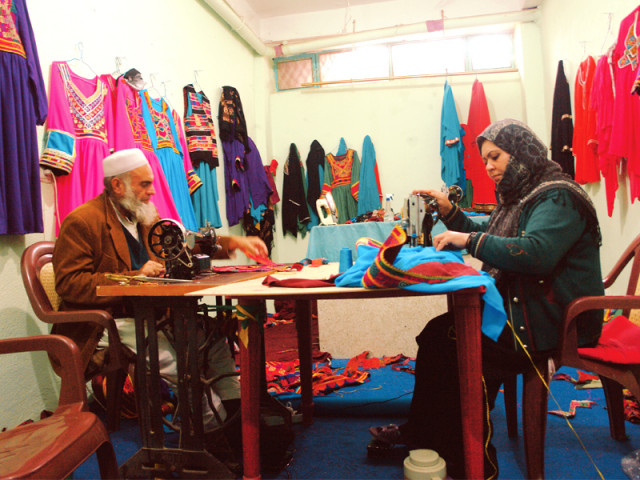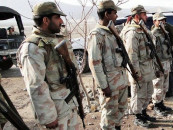Survival of Hazara: Reaping what they sew
Hazara women utilise their talent and earn cash for their families.

The wrought-iron basement door was standing open, despite bitterly cold temperatures, to allow a few stray beams of sunlight to help us see what we were doing in this dark room in a Kabul suburb where the power was off. As we excitedly sorted through heaps of beaded and hand-embroidered dress pieces, we discussed possible designs that would show them off to their exquisite best. Suddenly, the door darkened and Attaullah Waziri and I looked up in surprise.
A slight figure, tightly encased in a mud-splattered blue burqa, carefully stepped through drifting haze on the steep concrete stairs, a plastic bundle in her arms, mud-caked plastic shoes tip-tapping eerily as she descended to where we sat on the blue carpeted floor with our ‘treasure’ heaps. It was Fouzia, one of the most talented ladies to join our ‘Women’s Sewing Project’ which is aimed at helping widows, and other women from extremely poor backgrounds, earn an income and thus manage to survive in the harsh climate of Afghanistan as it is today.
Fouzia’s story is typical of those who have come to us at ‘Waziri Humanitarian Organisation’, a Kabul-based NGO, in search of help: A member of the long-persecuted Hazara community, she is just 28 years old, a mother to two sons and a widow since the age of 18.
“I was married at 14,” she relates. “And bore my two sons before I turned 18, when my husband died from a cerebral haemorrhage.”

Too proud to ask for help, Fouzia who lives in a tiny ‘house’ which belongs to her brother-in-law, turned to the only skill she had in order to make an income. “I had learnt embroidery from my grandmother and mother during the good times,” she explains, her burqa thrown back to expose her delicate, high cheek-boned face. “I also went to school then, up to 5th grade. I now ensure that my sons get the best schooling they can in our local government school, as without a good education they can do nothing.”
From her tiny home in the Hazara slum known as Dasht-i-Barchi, Fouzia began a long round of the distant, up-market city shops. She carried with with her examples of her delicate embroidery: work so fine that it is impossible to tell the upper side from the back and, because of its extraordinary quality she was able to get enough orders despite intense competition.
Then came the Taliban years. “God gave me hands and feet so I have to work,” she stresses. “The Taliban were not going to stop me from feeding my sons. I do not want help. I will not have my sons growing up thinking that their mother is weak. I want them to be proud of me.”

Not being able to stick to her previous routine with the Taliban on the prowl, Fouzia managed to make ends meet by selling to private customers only. “It was extremely difficult during those years,” she explains. “But I would not give in. I do have family members living near me but I refuse to ask them for anything. I will manage on my own and am doing the best I can. One day I will do even better and one day,” she says. “I will have a business of my own.”
The number of women involved in Waziri Humanitarian Organisation’s project is between 10 to 12 at the moment. Set up using Waziri’s own hard-earned cash, we have only been in operation for a few months. Two of the women are currently training with the paid assistance of a master tailor in the basement premises loaned by a friend; the rest are working from the privacy of their own homes or from tents in the overcrowded internal refugee camps where even the basic necessities of life are absent.
Our project currently has just three sewing machines on which two Hazara women, Majabeen and Najiba, studiously stitch traditional Afghan outfits under the tutelage of ‘Ustaad’ Sahib, a master tailor from Jalalabad. The finished clothes are then carefully ironed and packed ready for dispatch to outlets in California and Germany, which have agreed to market for us. In the meanwhile, negotiations with other potential outlets in New York and Canada are currently underway and we are also looking to the internet for sales. Profit is ploughed back into the project in the form of cloth, embroidery material and sewing machines so that more women can be trained.
The women working on the premises are paid a monthly income; plus, they are given a substantial lunch — which they happily take turns in preparing in the adjoining kitchen — and all the tea they can drink.

Those, such as Fouzia, are on a piece rate for whatever work they can find the time to do. Rates vary depending on the intricacy of the embroidery work they are requested to undertake. They are quite happy with the pay they receive, with more than one of them earning as much as Afghanis 15,000 per month which is Rs.30,000 and good even by Kabul standards where the cost of living is shockingly high.
The atmosphere in our basement is jovial: 20-year-old Majabeen, the only earning member of a family consisting of a sick father, mother and four younger siblings, happily jokes with Najiba. Najiba herself has four young children and her husband, a traditional cobbler has been rendered jobless due to the influx of cheap Chinese shoes in the bazaars. The income from her sewing also has to support her widowed mother-in-law and a brother-in-law who lost both legs during the years when the Mujahideen fought the might of the Soviet Empire.
Along with the new embroidery so painstakingly done by these women, we also reuse whatever antique Afghan embroidery work we can manage to find. These we buy from various sources who have travelled remote regions of the country, an increasingly dangerous task, in search of the rapidly dwindling amount of genuine pieces to be found. This is a painful indication of how desperate village and nomad women must be to resort to selling what is, in reality, their heritage and we are working towards, slowly and just one small step at a time, being able to incorporate at least some of these women in our project too.
Published in The Express Tribune, Ms T, March 31st, 2013.
Like MsT on Facebook for your dose of girl talk.



















COMMENTS
Comments are moderated and generally will be posted if they are on-topic and not abusive.
For more information, please see our Comments FAQ